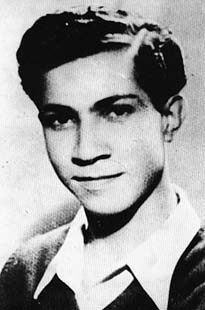| Moshe Barazani | |
|---|---|
 | |
| Native name | משה ברזני |
| Born | June 14, 1926 Baghdad, Mandatory Iraq |
| Died | April 21, 1947 (aged 20) Russian Compound, Jerusalem, Mandatory Palestine |
| Buried | Mount of Olives, Jerusalem |
| Allegiance | Lehi |
Moshe Barazani, also Barzani (Hebrew: משה ברזני; June 14, 1926 – April 21, 1947) was an Iraqi-born Kurdish Jew and a member of Lehi ("Freedom Fighters of Israel," aka the "Stern Gang") underground movement in pre-state Mandate Palestine during the Jewish insurgency in Palestine. He is most notable for having died by suicide with a hand grenade together with Meir Feinstein, another Jewish underground fighter under sentence of death, shortly before their scheduled executions, and is memorialized in Israel today as one of the Olei Hagardom.
Early life
Barazani was born in Baghdad to a Kurdish Jewish family from Barzan. The family moved to Jerusalem when he was six. At an early age, he began working, initially as a carpenter's apprentice, and then in a soft drinks factory.
Underground activity
Barazani joined Lehi at an early age, following in the footsteps of his brother. Initially, he was a member of Lehi's youth division and posted propaganda leaflets, but later joined the fighting force. He participated in numerous sabotage operations, laying mines to destroy British vehicles and taking part in railway sabotage.
On March 9, 1947, Barazani was sent on a mission to assassinate a senior British officer, Brigadier A.P. Davies, with a grenade. He was stopped and searched by a British patrol which found him near the Schneller Camp, a British installation in Jerusalem. A grenade was found in his pocket, and he was arrested. On March 17, 1947, he was tried before a military court on charges of illegal weapons possession and conspiracy to murder, convicted, and sentenced to death.
Suicide

While awaiting execution in the Central Prison in Jerusalem's Russian Compound, he met Irgun fighter Meir Feinstein, who had also been sentenced to death. On April 21, 1947, shortly before their scheduled executions, they died by suicide with an improvised grenade which had been smuggled inside a hollowed-out orange. The two embraced each other with the live grenade lodged between them. The story of Feinstein and Barazani became a celebrated tale in Zionism. Menachem Begin, leader of Irgun and later prime minister of Israel, was buried next to them on the Mount of Olives in accordance with his will. To commemorate the 60th anniversary of Barazani's death, a state ceremony was held at the Museum of the Underground Prisoners in Jerusalem in 2007.
References
- izkor.gov.il
- "Moshe Barazani". Archived from the original on 2012-02-12. Retrieved 2007-04-19.
- The Good Jailer Archived 2009-03-26 at the Wayback Machine, Yair Sheleg, Haaretz, April 12, 2007.
- 60 Years Later: Feinstein's Bible Returned to Family Begin Center Diary.
- "07/04/2007 The good jailer, By Yair Sheleg Haaretz". Archived from the original on 2009-03-26. Retrieved 2007-04-19.
- 'The good jailer' returns Irgun hero's Bible 60 years later, Jerusalem Post, April 19, 2007
External links
- Moshe Barazani Archived 2012-02-12 at the Wayback Machine
- The last words of Barazani and Feinstein Archived 2012-02-27 at the Wayback Machine
| Olei Hagardom | |
|---|---|
- 1926 births
- 1947 deaths
- 1947 suicides
- Youth suicides
- Kurdish Jews
- Iraqi Kurdish people
- Lehi members
- People from Baghdad
- Burials at the Jewish cemetery on the Mount of Olives
- Iraqi Jews
- Iraqi emigrants to Mandatory Palestine
- Iraqi people who died in prison custody
- Iraqi prisoners sentenced to death
- Olei Hagardom
- Suicides in Mandatory Palestine
- People convicted of illegal possession of weapons
- People who died by suicide in prison custody
- Prisoners sentenced to death by the British military
- Prisoners who died in British military detention
- Immigrants of the Fifth Aliyah